In festivals and during events, masquerades are mainly present to perform before an enchanted audience; while strutting their mojo at events, they provide people with a welcome distraction.
By Chimezie Chika
Ancestral Spirits?
One of most compelling passages in Chinua Achebe’s Things Fall Apart describes the emergence of masked spirits in the Umuofia village square thus:
The drum sounded again and the flute blew. The egwugwu house was now a pandemonium of quavering voices: Aruoyim de dededei! filled the air as the spirits of the ancestors, just emerged fromthe earth, greeted themselves in their esoteric language. The egwugwu house into which they emerged faced the forest, away from the crowd, who saw only its back with the many-coloured patterns and drawings done by specially chosen women at regular intervals. These women never saw the inside of the hut. No woman ever did. They scrubbed and painted the outside walls under the supervision of men. If they imagined what was inside, they kept their imagination to themselves. No woman ever asked questions about the most powerful and the most secret cult in the clan. Aruoyim de dededei! flew around the dark, closed hut like tongues of fire. The ancestral spirits of the clan were abroad.
From the passage, it is immediately clear that the role of the masked spirits or masquerades in Umuofia is that of powerful judges in the affairs of the clan. Their judgements are wise, and their words are final, for they are nothing but the departed ancestors of the clan. From the passage (and further down) we can also glean that the egwugwu masquerades are not very pleasant to look at: their faces are grotesque, and they bear the unnatural shape of spirits. Their occasional emergence from a sacred point in the village is highly symbolic of the peaceful existence of the village.
(Read also: The Legend of the Ogbanje: Superhuman Abilities, Wanderlust Between Life and Death)
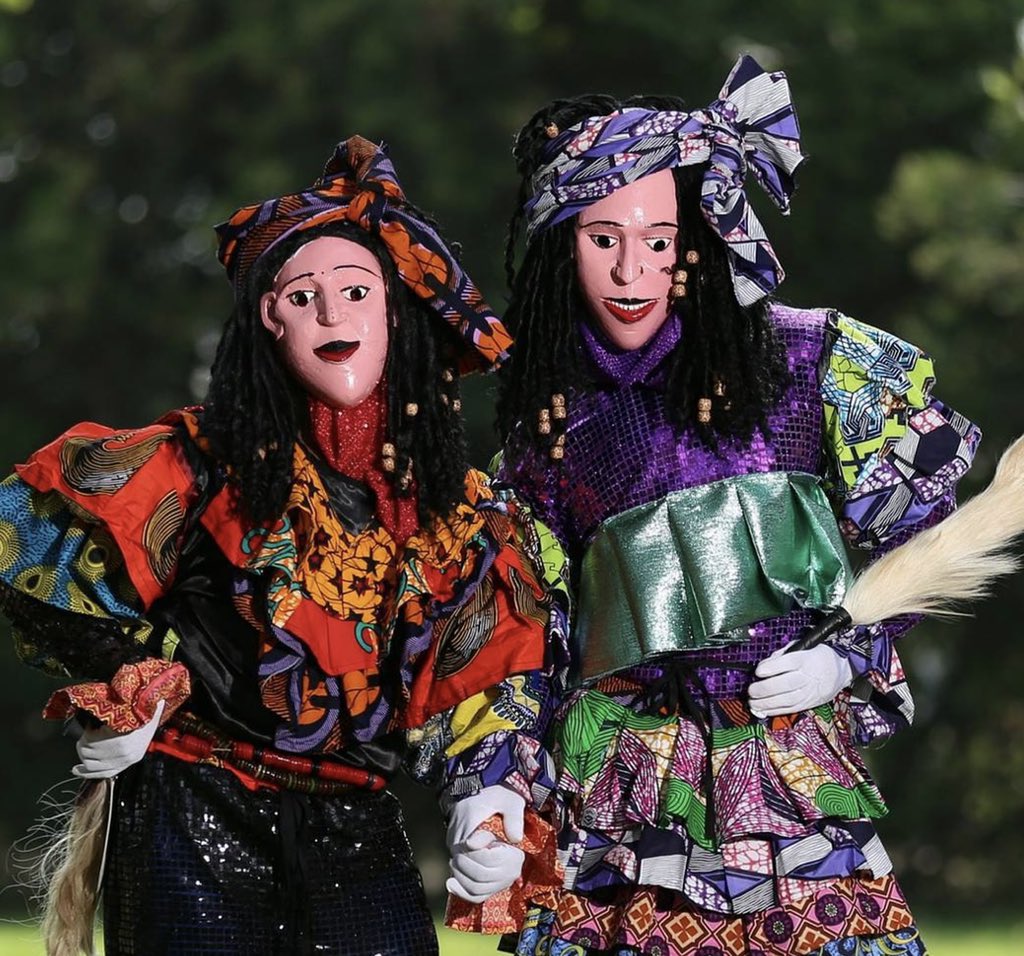
The sight of masquerades or masked spirits is still common in many parts of Igboland today. For anyone who has travelled through Southeastern Nigeria, one of the most common sights you are bound to encounter are the colourful masquerades that appear during the traditional festivals and events. During the festive seasons, the sight of masquerades engaging in mock chase, dancing or exchanging whips add to the excitement.
For many people, the knowledge of masquerades stops here. Indeed many Igbo people today will be hard pressed to explain what a masquerade really means. The sight of a group of masquerades holds a fascinating cultural allure to members and non-members of the tribe, so that a sightseer is immediately drawn to it. Yet, what are these multi-coloured, multi-shaped things prancing about and speaking in guttural voices? There are many conflicting opinions as to what masquerades actually are. Opinions range from the fairly rational to the ridiculous. Some people believe that masquerades are ants that suddenly metamorphosed into giant, scary-looking spirits among humans. In some quarters, it is believed that these masked spirits emerged from anthills in the ground. Others have dismissed this anthill story as lacking any credibility. The general consensus, however, is that masquerades are spirits from the land of the dead.
Ifeanyichukwu Umeadi (real name), a teacher and businessman from the town of Ogidi in Anambra State, southeastern Nigeria, offered an answer. “Masquerade means spirit in Igboland. It is a cult reserved for men of ripe age. Even though it is the members of the masquerade cult that go under these masks, when they do, they become embodied spirits. No longer humans.” We were sitting outside his house, under a big mango tree, as he spoke. “You know, initiation into the masquerade cult is not a child’s play and is reserved for only the male gender, due to some traditional reasons. My own father initiated me into the Ikenga masquerade cult when I was twelve years old.”
In our long conversation, Umeadi expanded on the significance of the masquerade cult to the wellbeing of his town. It was integral, he said, in fostering peace, solidarity, and respect for elders and ancestors of the town. Was I a member of the masquerade cult in my own village? He’d asked at the beginning of our conversation. It was important for him to know that I was a kindred spirit, he said, before he could spill some esoteric knowledge. In response, I answered in the affirmative and went on to say that many children of my generation and beyond were initiated members of the masquerade cult, except the ones from explicitly Christian families. There were hierarchies in the masquerade cult. A young initiate cannot become a carrier of certain strong masks. In places like Nnewi, the carrying of great masquerades such as Ajofia (Evil Forest) is an inherited responsibility and cannot be carried by just any initiate.
In my village, in Umuaka in Imo State, initiation into the Oghu masquerade cult is done through an esoteric ceremony, open to only initiates, involving the killing of a goat for a feast and the gathering of the elderly custodians of the cult who will say a few words in the desired direction, among other activities, during the ceremony, after which the young initiates become regarded as full men. Initiation into the masquerade cult of a village or town is a rite-of passage into full manhood. This same thing occurs all over Africa in different guises. In their works, writers, Ngugi wa Thiong’o, and Camara Laye, have described different manhood rites of passage ceremonies of the Mandingo and the Kikuyu peoples.
Ugochinyelu Chinweuba, an engineer and custodian of many deities in his town of Nteje Abogu in Anambra State, offered a deeper explanation of the meaning of masquerades in Igbo culture. “Masquerade, which is mmanwu in Igbo, is the direct opposite of the human being, which is mmadu in Igbo,” he said. “Mmadu is derived from the root words, ‘mma’ (beauty), and ‘ndu’, (life). Thus mmadu (human being) means ‘the beauty of life’. This is what the human being means. But mmanwu (masquerade) is the exact opposite. The word comes from two root words in the language: ‘mma’ (beauty) and ‘onwu’ (death). Thus masquerade in Igbo simply means ‘the beauty of death.’ What this means is that masquerade is the way in which our people celebrate the dead, our departed ancestors.”
Chinweuba would go on to explain that not too long ago, bereaved families sent their dead away during burial ceremonies by saying, “Continue your journey till we meet on the next mmanwu celebration day.” Masquerade festivals are a means through which the Igbo celebrate the dead. The grotesque, disfigured faces of the mask are made so in the belief that, in death, the physical state of human beings become disfigured.
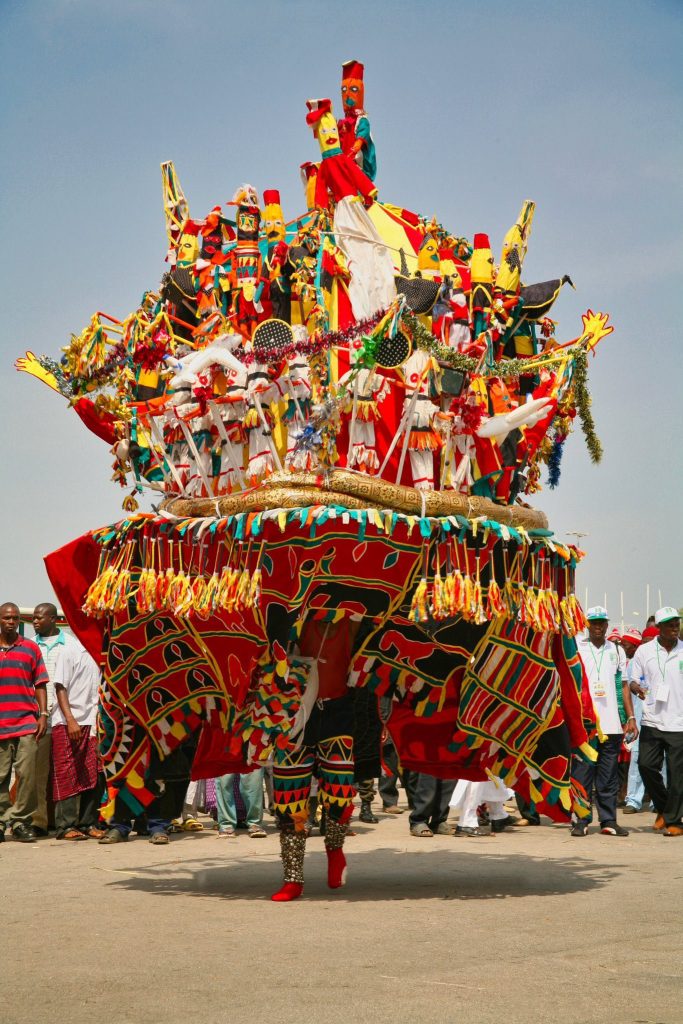
When ancestors die, they switch into the world of the dead, where the ancestors who had done good go to dwell. The Igbo hold a belief that there is a weak link between the world of the living and the dead, and that the movement of beings and spirit bodies between these worlds is unrestrained. In common superstitions and in other everyday manifestation of the Igbo worldview, the evidence appears stark: water is not to be fetched from certain rivers at certain hours of the day, no one goes to the market at night, lonely anthills in the bush are not to be touched, for these are times, portals and meeting places of the worlds. And when these spirits emerge from these portals and meeting places, they appear as masquerades.
Is the Masquerade a Dying Art?
In my travels through eastern Nigeria, talking to people about the significance of masquerades in modern Igboland, there is a trail of nostalgia that attends many of the conversations. Many agree that the respect for masquerades is not what they used to be. “Today, you see a lot of anomalies like people from another town carrying masquerades from our town. A real abomination has entered amongst us,” said Umeadi. Chinweuba agrees that the relevance of masquerade festivals seems to be fading in many places. He also pointed out that there are still other parts of the Igbo country where the masquerade culture remains very strong. A fresh leaf can be taken from the management of Halloween—which has origins, similar to Igbo masquerades, in the celebration of the dead—by western culture. Today, Halloween is a multi-billion dollar industry in the West, while masquerade culture in Igboland and much of Africa remains demonised in religious circles, stunted by a lack of forward-thinking imagination.
If we consider the dramatic fanfare that accompanies the emergence of a masquerade, we will perhaps appreciate the full beauty of how it stands for the identity and culture of Igbo people. A great masquerade such as the Ijele, with its mammoth round body, bears several artefacts, masks, tiny mirrors, gongs, and multi-coloured fabrics on its body. There is ethereal grace in the swirling movement of its rotund body. There is a cocoon of traditional histories and knowledge nestled in its peak. There is in the music that accompanies it, the glory and pride of a people. The Ijele is the largest masquerade of the Igbo and represents the confluence of all other masquerades.
The Igbo believe that the masquerade and the entirety of its accoutrements, especially the mask, is an art. The masquerade is an artistic synthesis of costumes, music, performances and poetic chants. The masquerade is not only the raffia or colourful jute costume and fabrics, it is also the ghastly face of the mask, the smoking pot, the machete, the dolls, the attendants, and other symbols it carries, depending on the masquerade. Hence, a masquerade is not “worn” like a cloth but “carried” like a weight—pointing to the great responsibilities that come with making such a symbolic cultural and spiritual art.
In festivals, and during burial ceremonies, masquerades sometimes come out in colourful and often exciting display of rich culture to symbolise the presence of ancestors who have come to oversee the final accompaniment of a man’s physical body into the world of spirits by fellow spirits who now serve as sentries that guide him into the new realm. It is like the last drama of life enacted in honour of a man who had led a long, fulfilling life, for the Igbo believe that life is nothing but a series drama at different stages of living, from birth to death. Each milestone is marked by a ceremony; from name-giving at birth, marriage in adulthood, and burial at death—each appropriately occasioned by ancestors, physically or not.
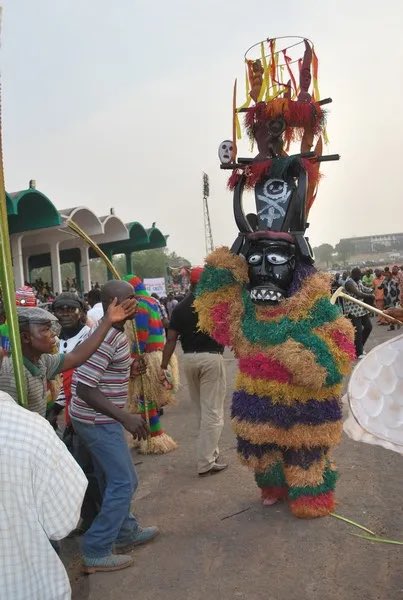
(Read also: Ishiagu Fabric: How the Wrong Totem Became the Symbol of the Igbo People)
Thus old men in Igbo land are highly respected for what they represent, for an old man, at a certain ripe age, manifestly becomes half-man, half-spirit. At that age, his wisdom and ability to “see” is believed to be greater than his younger counterparts. He thus becomes a walking masquerade. Some masks can only be carried by such men. One such mask is Agaba, a fearful grotesque thing believed to be activated by very potent medicine. What is important is that in masquerades, the Igbo have found the ultimate enactment of the drama of life.
In a modern world fast-tracked by the proliferation of other religions and cultural orientations, assailed by the capitalist craze for economics of scale and a philistine disdain for anything that has no monetary value, is the masquerade art dying? The answer to this question will require something greater—and perhaps more hands-on—than another high-falutin essay about the need for cultural preservation.
Entertainment and the Future
Beyond Igbo metaphysics, there is the concept of uwamgebede—the notion of evening frolicking and exchange of shallow words and idioms, which the Igbo value highly. Masquerade parades and festivals are also an integral part of uwamgbede. Masquerades, whatever they are or seem to be in more grave terms, have one generally accepted utility in Igboland: entertainment.
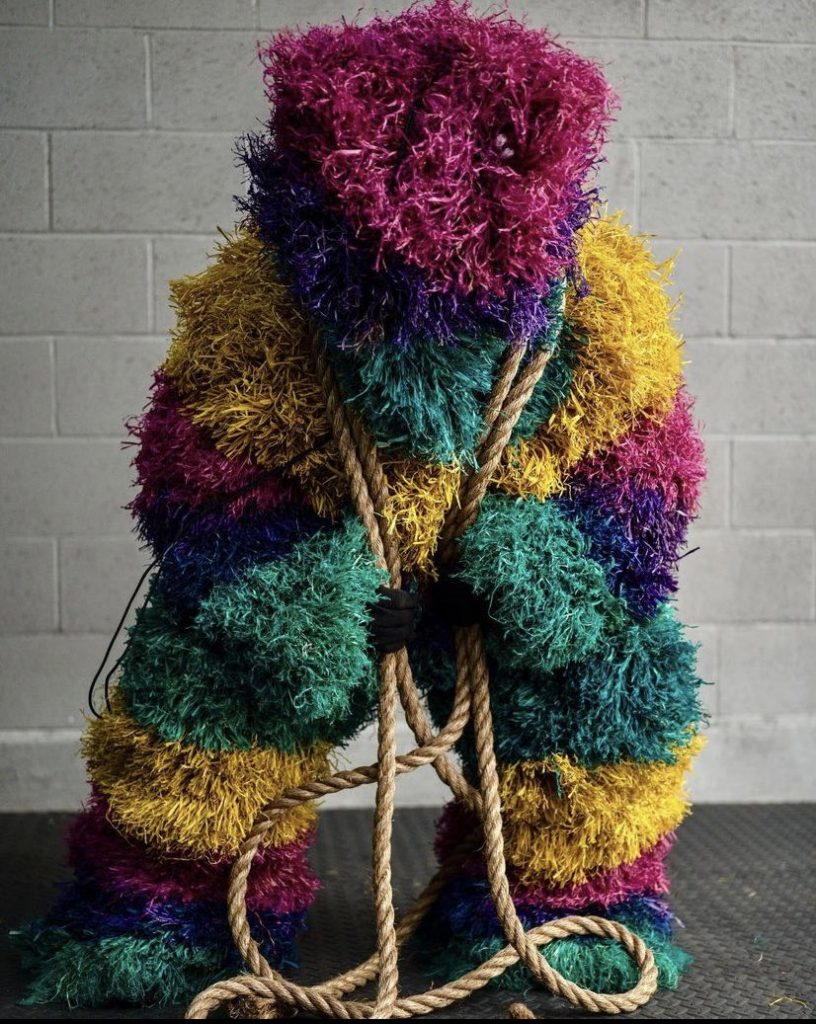
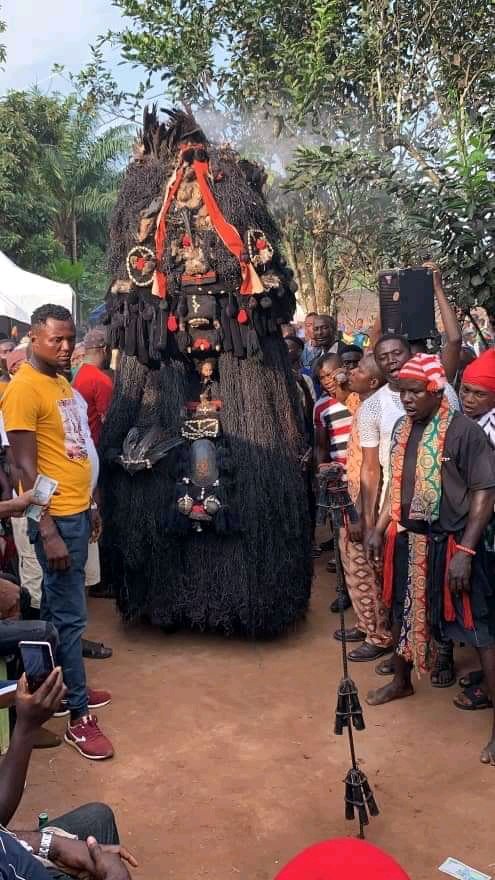
In festivals and during events, masquerades are mainly present to perform before an enchanted audience; while strutting their mojo at events, they provide people with a welcome distraction. “The sole reason I ask my children to go out and engage in masquerade-watching is the sheer joy that comes from it. It has been there for generations,” Umeadi said with finality, raising his hands in the air. Most appearances of masquerade groups in public are to entertain people, to elicit joy in a variety of activities, whether it is the beautiful and choreographically accomplished Adamma (Daughter of Beauty), jiggling her legs from an impossible angle, or Aji Buusu (Cat’s Hair) shaking his prodigious amount of jute ‘hair’; the tableau for the appearance of masquerades rests on their ability to cause joy and relaxation in the faces of people. Here, too, is where the future of masquerades lies.
If the masquerade culture is to continue flourishing despite the thousand arrows thrown at it by globalisation and religious scepticism, then it is in entertainment that it will find eventual agency. In taking its entertainment potential to the next level, masquerades will continue to exert great cultural relevance.
Chimezie Chika’s short stories and essays have appeared in, amongst other places, The Question Marker, The Shallow Tales Review, The Lagos Review, Isele Magazine, Brittle Paper, Afrocritik, and Aerodrome. He is the fiction editor of Ngiga Review. His interests range from culture to history, art, literature, and the environment. You can find him on Twitter @chimeziechika1.




